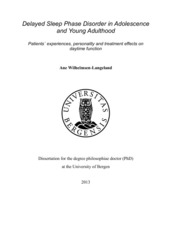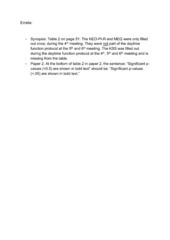| dc.contributor.author | Wilhelmsen-Langeland, Ane | en_US |
| dc.date.accessioned | 2014-01-09T10:43:59Z | |
| dc.date.available | 2014-01-09T10:43:59Z | |
| dc.date.issued | 2013-11-26 | eng |
| dc.identifier.isbn | 978-82-308-2417-7 | en_US |
| dc.identifier.uri | https://hdl.handle.net/1956/7649 | |
| dc.description.abstract | Delayed sleep phase disorder (DSPD) is a circadian rhythm sleep disorder where the sleep period is delayed compared to conventional norms. Patients with DSPD typically report complaints of excessive daytime sleepiness and impairments in daytime functioning. Patients with DSPD have a rigid circadian rhythm delay which is considered difficult to advance by behavioural means only. The knowledge about this disorder is scarce in the general population as well as in primary health care settings. Limited knowledge often leads for example parents and teachers to view the delayed sleep pattern in the young person as solely due to behaviour or motivational factors. Over time, the young person might also adopt this concept, which adds to the problems innate in the diagnosis. There is also a lack of evidence-based guidelines regarding how to diagnose, examine and treat DSPD. The first aim of this thesis was to develop a description and exploration of the experiences of patients diagnosed with DSPD regarding their daily challenges and coping mechanisms, by individual in-depth interviews. The second aim was to investigate the personality profile and other psychological aspects of patients with DSPD in a comparative study with healthy controls. The third aim was to assess the effect of treatment with bright light and melatonin on daytime function in patients with DSPD in a randomized controlled trial. The first paper is a report from a qualitative study with individual in-depth interviews with a sample of 9 participants (16-23 years) diagnosed with DSPD. Analysis was done using systematic text condensation (STC). A core theme in all interviews was how to cope with different challenges related to the disorder. We labelled the identified challenges: 1) To give something up; 2) To blame something or someone; and 3) To have a problem or not. Awareness of these challenges adds to our understanding of the daily struggles of those with DSPD and may improve clinicians` competence and ability to help them. The study in paper 2 is the first to investigate the NEO-Personality Inventory- Revised (NEO-PI-R) profile of young adults with DSPD. We included 40 patients diagnosed with DSPD (mean age 20.7) and 21 healthy controls (mean age 21.1). Results showed that young adults with DSPD scored higher on Neuroticism, lower on Extroversion and much lower on Conscientiousness than the control group. Assessing the personality profile of young adults with DSPD before initiating treatment might provide a useful clinical guidance regarding the individual needs for follow-up during treatment. The study in paper 3 was an investigation of short- and long term effects on subjective and objective sleepiness and cognitive function of treatment with bright light and melatonin alongside gradually advanced rise times. The same 40 patients with DSPD from paper 2 participated in the treatment study. Four treatment conditions were used in the short-term intervention (two weeks); dim light (placebo) + placebo capsule, bright light + placebo capsule, dim light (placebo) + melatonin capsule and bright light + melatonin capsule. This was followed by a long-term intervention (three months) including two conditions; no treatment and combined bright light + melatonin. On a gradual advancement of rise time schedule, all treatment conditions (placebo, bright light, melatonin and the combination) were almost equally effective in improving subjective daytime sleepiness, fatigue and cognitive function in the two-week study. Combined bright light and melatonin treatment improved subjective daytime sleepiness, fatigue and cognitive function in the three-month study. Long-term treatment increased some of the positive effects seen after two weeks. The no-treatment group returned to baseline values on most variables in the three-month study. To conclude, we suggest that caregivers (parents, psychologists, doctors, nurses and others) might be in a better position to help and support young patients with DSPD if they recognize some of the challenges this diagnosis entails. We also suggest that awareness about these challenges should be acknowledged in future research on DSPD. This might increase our understanding of the perceived losses and gains of trying to adapt to a socially accepted sleeping pattern and other challenges faced by youngsters suffering from DSPD, which can influence the emotional consequences of the disorder. Assessing the Big Five personality profile of young adults with DSPD before initiating treatment, might provide a useful clinical guidance regarding the individual needs for follow-up during treatment. Future studies are warranted to examine the causal relationship of the personality profiles of patients with DSPD. Gradual advancement of rise times seems to be sufficient in producing positive effects on subjective sleepiness, fatigue and cognitive performance in short-term treatment of patients with DSPD. However, the benefits from gradually advanced rise times seemed to wear off, suggesting that continuation of bright light and melatonin treatment is beneficial to maintain positive effects over time. | en_US |
| dc.language.iso | eng | eng |
| dc.publisher | The University of Bergen | eng |
| dc.relation.haspart | Paper 1: Wilhelmsen-Langeland, A., Dundas, I., Saxvig, I. W., Pallesen, S., Nordhus, I. H., & Bjorvatn, B. (2012). Psychosocial Challenges Related to Delayed Sleep Phase Disorder. The Open Sleep Journal, 5, 51-58. The article is available at: <a href="http://hdl.handle.net/1956/7647" target="blank">http://hdl.handle.net/1956/7647</a> | en_US |
| dc.relation.haspart | Paper 2: Wilhelmsen-Langeland, A, Saxvig, I. W., Pallesen, S., Nordhus, I. H., Vedaa, Ø., Sørensen, E., Bjorvatn, B. (2014). The Personality Profile of Young Adults with Delayed Sleep Phase Disorder. Behavioral Sleep Medicine, 12(6), 481-492. The article is not available in BORA due to publisher restrictions. The published version is available at: <a href="http://dx.doi.org/10.1080/15402002.2013.829063" target="blank">http://dx.doi.org/10.1080/15402002.2013.829063</a> | en_US |
| dc.relation.haspart | Paper 3: Wilhelmsen-Langeland, A, Saxvig, I. W., Pallesen, S., Nordhus, I. H., Lundervold, A. J., Vedaa, Ø., Bjorvatn, B. (2013). A randomized controlled trial of treatment for delayed sleep phase disorder. Effects on subjective and objective sleepiness and cognitive function. Journal of Biological Rhythms, 28(5), 306-321. The article is available at: <a href="http://hdl.handle.net/1956/7648" target="blank">http://hdl.handle.net/1956/7648</a> | en_US |
| dc.title | Delayed Sleep Phase Disorder in Adolescence and Young Adulthood. Patients` experiences, personality and treatment effects on daytime function | en_US |
| dc.type | Doctoral thesis | |
| dc.rights.holder | Copyright the author. All rights reserved | |

